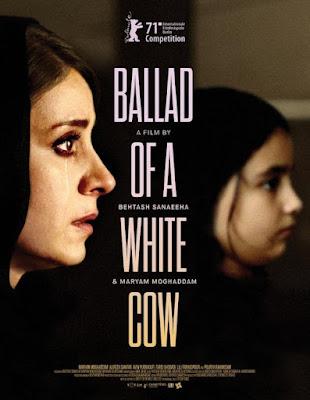
And recall when Moses said to his people, “Allah commands you to slaughter a cow”
They answered, “Do you make a mockery of us?”
---“Surah of the Cow” in the Holy Quran (Opening quote in the film)
Iran continues to make interesting feature films, year after year, bereft of sex, nudity, escapist car chases and on-screen violence. Ballad of a White Cow is a tale of the bread-winner of small nuclear family found guilty of the killing of a known friend by a court, condemned to death by a three judge bench according to Iranian law and consequently executed for the crime. Later, the real killer confesses to the crime. A miscarriage of justice has unintentionally taken place.
While the wife of the hastily executed innocent man approaches the Iranian Supreme Court for justice for her and her mute daughter and retribution for the judges, one of the three judges is devastated by the revelations of the real killer and reaches out to help the wife and child of the executed prisoner, without revealing his own identity, and quits his job as a judge much to the amazement of the judiciary and officials, as he had merely applied existing laws of the land. That single judge, among the three judges who jointly passed the hasty sentence, makes a laudable effort to make amends even before the Supreme Court surprisingly ruled that the wife and child had to be compensated and judges be held responsible in some way. The film is an implicit critique of capital punishment and of miscarriage of justice.
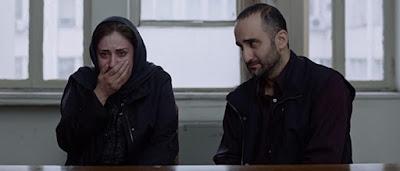
Mina (Maryam Moghadam) with her brother-in-law
reacting to the information that her dead husband
was innocent and the real killer has confessed
The interesting original script treads more on the indirect punishment on the blameless wife Mina (played by the screenplay-writer and co-director Moghadam) and daughter, living in a rented apartment. If a strange man, Reza (Alireza Sani Far), visits her to pay back “a loan” he took from Mina’s husband, the owner of the rented apartment also hastily assumes his tenant is involved in some immoral activity and asks Mina to speedily vacate. In Iran, a single woman with a child and without a job, cannot easily find an alternate accommodation at short notice, even if she has the money. Thus, the film is not just about capital punishment and miscarriage of justice, it is a commentary on single women/mothers in Iran. However, women in Iran do enjoy a lot of freedom and respect compared to their counterparts in some other Muslim countries, such as Saudi Arabia.
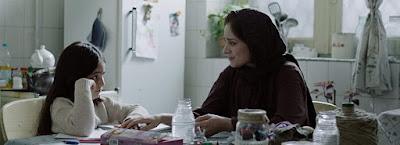
Mina explains to her daughter Bita
that her father has gone far away
Reza is a rare individual with a conscience. His life as a judge crumbles with a hasty judgment he made with two others on the basis of questionable evidence. Reza’s son, whose mother is either dead or divorced, is so alienated from his father after he learns of his father’s involvement in the miscarriage of justice that he rushes to join the army and soon commits suicide. Reza is twice broken. But the good man has no courage to inform Mina that he was one of the three judges who hastily condemned Mina’s husband to death.
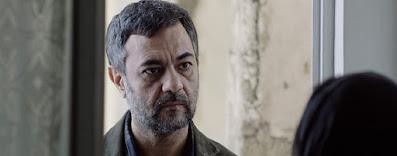
The Judge Reza (Alireza Sani Far) arrives at Mina's
door without revealing his true identity, stating that
he has come to return a large sum of money
her husband had lent him
What follows has to be interpreted keeping in mind the opening quote about the cow. A white cow is shown in a mosque (the barbed wire on the walls resemble a prison) readied for slaughter early in the film to help the viewer with a visual connection to the opening quote. The script-writer Moghadam envisages Mina as a worker in a milk-packaging factory, a metaphoric connect to the innocent cow in the quotation. Mina does seem to eventually accept her husband’s execution as a submission to the will of Allah (God) as a good Muslim. When Mina realizes her husband was innocent she finds that she and her mute daughter seems to have been “mocked” by the judicial system. The “mockery” extends to Mina, already under stress from the judiciary, the owner of her initial apartment, and Mina’s father-in-law trying to grab the “blood money” or the financial compensation from the government, added up to Mina losing her job at the milk packaging factory, due to a strike. The finale of the film could confound an average viewer but if the viewer realizes Mina is intelligent, the ending is easy to decipher. The tale can be considered as a modern-day parable. The tale is a very interesting confrontation of the ethics of a remorseful judge and that of the eventual suffering victim’s ability or lack of ability to forgive. The viewer is left much to ruminate on.
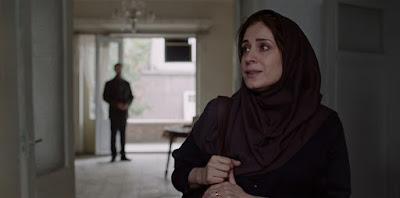
Reza realizing Mina's problems of finding
a new apartment provides her an apartment he owns
that is lying unused at discounted rent

Mina and Bita prepare for an uncertain future
Ms Maryam Moghadam (spelled Moqaddam in Wikipedia) and Mr Behtash Sanaeeha are a rare husband-wife team making their first film Ballad of a White Cow as co-directors which won them the awards for the Best New Director at the 2021 Valladolid International Film Festival in Spain. The Uruguayan/Mexican couple of Rodrigo Plá and his wife Laura Santullo are another team who made their first film as co-directors. In both these husband-wife teams, the wife is the main original writer of award-winning screenplays. Unlike Ms Santullo who has never ventured to act, Ms Moghadam is an accomplished actress, having worked as actress in Jafar Panahi’s Closed Curtain (2013) and her husband’s debut film Risk of Acid Rain (2015) and several other feature and TV films. Ms Moghadam’s script refers to a film Bita (1972), made in Iran prior to the Ayatollah revolution, a favorite film of her daughter, Bita, named after the title character of that film. Bita, though mute, can hear and enjoy feature films and is a film addict. The film Ballad of a White Cow is dedicated to “Mina,” which some feel is the name of the screenplay-writer’s mother. If that is indeed true, young Bita’s love for films is an autobiographical trivia of the lady co-director.
P.S. Ballad of a White Cow has won, apart from the Valladolid award mentioned above, the Best Film award at the Jerusalem Film Festival (Israel), an incredible honor in light of the fact that there is not much love lost between Israel and Iran. The film is currently competing for the Krzysztof Kieslowski award for the best film at the Denver film festival. Rodrigo Plá's and his wife Laura Santullo's first co-directed film The Other Tom was reviewed earlier on this blog. (Click on the film's name in this postscript to access that review)

